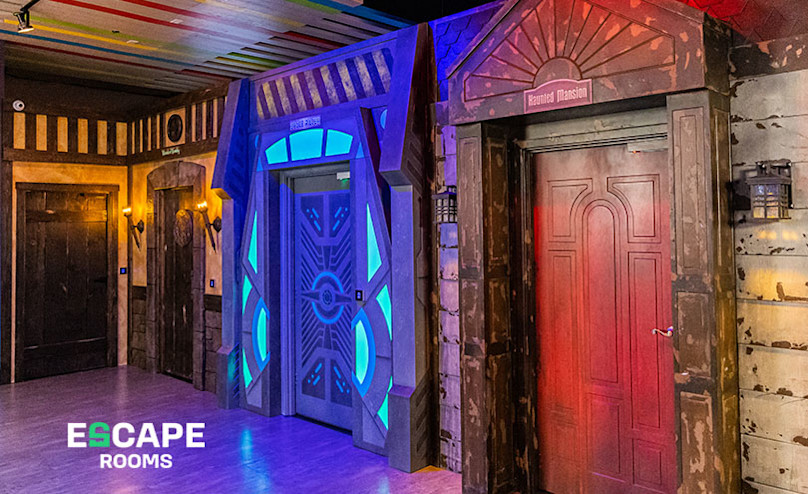Thrilling Escape Room in Minneapolis Mall of America-- Reserve Currently
Thrilling Escape Room in Minneapolis Mall of America-- Reserve Currently
Blog Article
Team Approaches: Exactly How to Team up Successfully in an Escape Room
Browsing the intricacies of an escape space demands greater than simple excitement; it calls for a well-coordinated approach based in clear interaction, strategic role assignments, and skilled time administration. Teams should proactively listen to each participant's insights, appoint duties that line up with individual strengths, and maintain regular check-ins to make certain emphasis and avoid redundancy. By fostering an environment that values communication and versatility, groups can significantly enhance their effectiveness and success rates. The subtleties of these techniques can transform the experience, yet how specifically can they be carried out to maximize the possibility for success?
Establish Clear Communication
To help with clear interaction, it is necessary to mark a central factor of get in touch with for info dissemination. Quick, concentrated updates from each group participant can maintain the group notified without frustrating them with info.

Designate Roles Purposefully
While clear interaction establishes the structure for reliable teamwork, appointing roles purposefully makes sure that each group member's toughness are used efficiently. In a getaway area situation, the time-sensitive and complex nature of difficulties necessitates an efficient technique to task delegation. By recognizing and leveraging individual expertises, teams can enhance their problem-solving abilities and enhance overall performance.
Somebody with an eager eye for detail might succeed in discovering surprise items, while a rational thinker could be better suited to fixing challenges. This duty frequently needs strong organizational and social abilities.
Second, guarantee that roles are versatile and versatile. As brand-new difficulties emerge, the team needs to have the ability to pivot, reallocating jobs as called for. This flexibility aids keep momentum and protects against bottlenecks that might take place due to rigid role jobs.
Eventually, a calculated method to duty project not just optimizes the staminas of each employee however likewise fosters a natural setting, driving the team in the direction of a successful escape.
Make Use Of Diverse Abilities
Recognizing and utilizing the diverse skills within your team can significantly elevate your performance in a retreat space. Each team participant brings unique staminas to the table, and effectively leveraging these capacities can accelerate analytic and enhance total performance. see For example, a group member More hints with solid logical abilities could stand out at deciphering complicated codes or patterns, while one more with eager empirical abilities may quickly identify hidden hints that others might forget.
Motivate group members to articulate their insights and ideas quickly, guaranteeing that all possible solutions are considered. Furthermore, appointing tasks that straighten with each participant's staminas can avoid traffic jams and guarantee that development is constant.
Furthermore, diversity in skills typically equates to diversity in believing styles, which is indispensable in a getaway space setup. While some difficulties may require sensible thinking and accuracy, others could profit from creative and side reasoning. By acknowledging and leveraging this diversity, teams can attend to a more comprehensive variety of obstacles a lot more effectively, consequently enhancing their chances of an effective retreat.
Manage Time Efficiently

First, allot initial minutes for a quick study of the space. Recognize noticeable puzzles and divide tasks based upon employee' staminas, ensuring address that nobody is idle. Establish internal time checkpoints to evaluate progression periodically; for example, objective to have half the puzzles resolved by the mid-point of the video game. This practice can aid maintain the group concentrated and avoid time from escaping unnoticed.
Additionally, prevent one-track mind. If a challenge is taking also long, turn staff member or carry on to one more challenge, returning later with fresh perspectives. Interaction is paramount-- maintain everyone updated on addressed challenges and continuing to be tasks to avoid redundant efforts.
Lastly, utilize any kind of hints or hints sparingly yet tactically - best escape room. Recognizing when to ask for help can save valuable time. By adhering to these time management concepts, groups can significantly improve their opportunities of an effective and delightful escape space experience
Debrief and Mirror
Reflection is an essential aspect of group advancement and enhancement in the context of retreat rooms. When the difficulty is finished, whether efficiently or otherwise, it is essential for the team to engage in an organized debriefing session. This process enables team members to examine their efficiency, determine staminas, and determine locations for renovation.
Start the debrief by discussing what worked out. Highlight certain circumstances of effective interaction, analytic, and cooperation. Recognizing these favorable behaviors reinforces them and encourages their rep in future obstacles.
Discuss minutes of confusion, miscommunication, or inadequate methods. Urge an open and useful discussion where group participants can share their viewpoints without concern of criticism.
Conclusion
In verdict, effective cooperation in a retreat area is based upon clear interaction, strategic duty tasks, the effective application of diverse skills, and proficient time monitoring. Normal check-ins and structured debriefings are important for maintaining focus and fostering continual renovation. By developing a natural and flexible group environment, the chance of effectively addressing challenges and accomplishing the purpose of escaping the space is dramatically boosted. This approach not only guarantees success however also promotes collective development and understanding.
Report this page